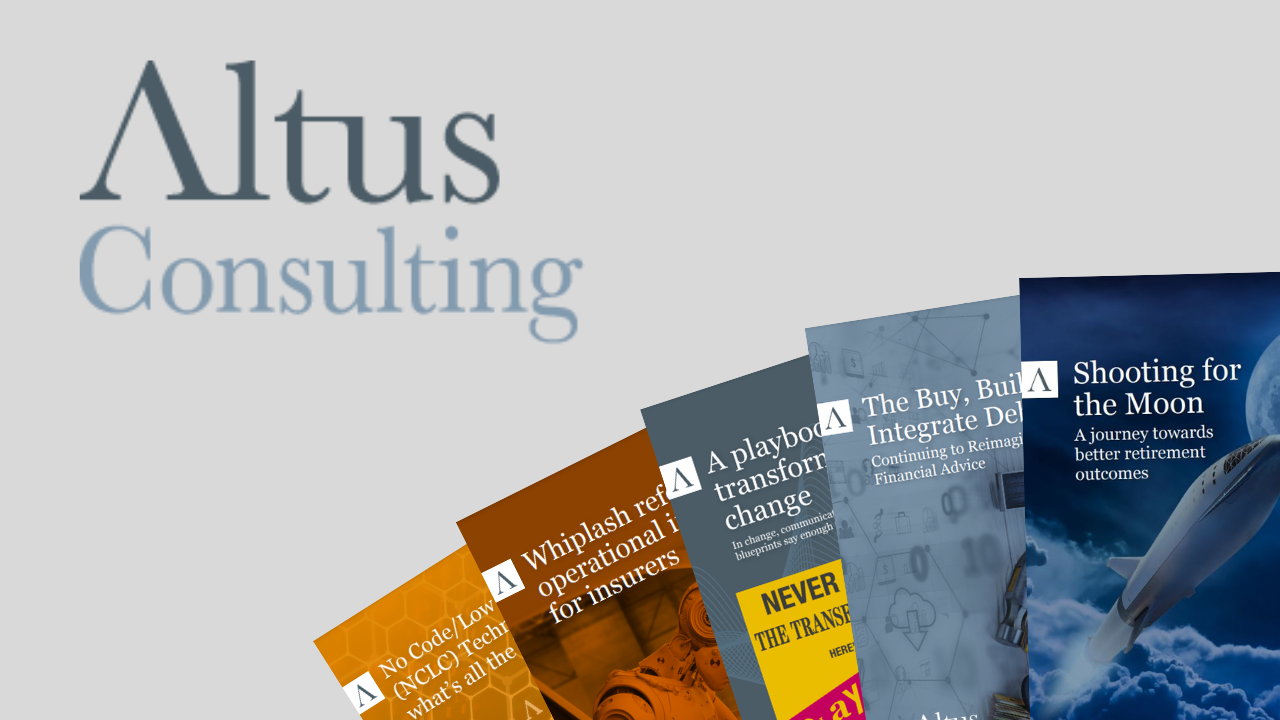Two small words: Digital advice. Or, Robo advice. Automated advice. Online advice. Streamlined advice. Or how about hybrid advice or cyborg advice? Or Digital wealth. Whatever the terminology, it’s on the agenda in every boardroom of every business I speak to. To maximise the opportunities – or defend against an emerging and very real threat.
And regardless of the terminology you use, one thing is certain: from the simple fintech propositions to the big high street brands re-entering the advice market; wealth managers getting in on the action; even to the global tech giants eyeing up the opportunity – Digital Advice – in its many and various guises – is here to stay.
This is a far cry from the early days, just a few short years ago, when the term ‘robo-advice’ was used to disparage the early disruptors such as Wealthfront and Betterment in the US, and Nutmeg in the UK. There is no doubt – digital advice has gone global. Indeed, Altus is currently tracking over 100 propositions, services, and suppliers along the digital wealth value chain… just in the UK!
And based on Altus consumer research, a multitude of client engagements, hundreds of meetings and site visits, various RfI and due diligence exercises, judging industry awards, and sharing thoughts and ideas with digital and wealthtech experts all round the world, we’re in a privileged position to cut through the hype and provide a real insight to what is really going on.
A commercial reality
First up – the elephant in the room: the commercial model. For many – it simply…doesn’t…work. And that’s because the right business model isn’t in place, which is why we now see:
- Many D2C propositions:
- searching for B2B2C partners
- extending their propositions into the pensions and at-retirement space
- looking for significant investment or even to be acquired.
- The initial focus on the Millennials segment has now broadened into other customer and wealth segments.
- A number of organisations looking to Workplace and affinity groups.
- Wealth Managers and advisory firms wishing to extend their services to a new segment of customers (though personally I think many have misunderstood how to do this – simply ‘‘slapping a logo on a robo’ is not a winning formula); others are fighting back against the ‘robos’ by using active management as a key differentiator, a key element of their value proposition.
- Asset managers aiming to develop a new direct route to market, and protect the back book (but have they got the consumer brand to do this?)
- Life companies trying to up their game to remain relevant. Or face the consequences.
- Some ‘robos’ looking to new markets – mortgages, protection, equity release… even DB transfers…
Distribution is (still) king
Identifying and accessing customers with a real need is key. Distribution remains king, and understanding how to digitally market to a range of consumers is absolutely critical.
‘Build it and they will come’ is a complete fallacy! No they won’t! It doesn’t matter how beautiful and engaging your site is if hardly anyone ever sees it! Is social media part of the long-term answer?
The high street incumbents, of course, have got the brand (i.e. trust), the scale (the existing customer base), and deeper marketing pockets – but often the internal culture stifles the pockets of innovation.
Just being an incumbent doesn’t guarantee success – let’s face it, there have already been one or two high profile failures. But – being an incumbent absolutely should give them an advantage.
Collaboration – between the incumbents and the smaller players – will be key for many, and those businesses both home and abroad that recognise this – and have changed their internal processes and governance to accommodate – will reap the benefits in the longer term.
Advice – with a capital ‘A’ or small ‘a’
Consumers generally want advice. Yes, I accept there is a segment of investors who are self-directed – but not every provider can go after them and succeed! So, those consumers who are left – the vast majority – they might call it advice, they might call it something else – support, help, even guidance, perhaps – but advice – with a small ‘a’ or capital ‘A’ – is where it’s at. An increasing number of businesses I talk to recognise this. Those that don’t – or that don’t offer a differentiated proposition – yet still charge as much (or in some cases more) than those that do offer advice – time is running out… it’s time to think again…
Time to add some sparkle
Customer experience, of course, is critical. We all know that. And yet – having personally used many digital propositions in the market, both in a personal capacity and also for work research and work assignments, I’m sorry to say that many are DULL. Really dull. And not intuitive at all. Full of jargon and things that most people just don’t understand. And ‘me too’ – where’s the imagination and the desire to differentiate, to delight? And we wonder why the numbers in the business case that have been so carefully crafted haven’t been met!
Which leads up nicely on to the benefits of behavioural finance. If you’re not incorporating latest thinking into your work you’re missing a trick. And missing an opportunity to engage, to enthuse, to motivate people to save and invest. Understanding the moments of truth where human engagement and reassurance is needed, rather than just a pure digital experience, is so important. That can be the difference between building a relationship with a client, building trust… or losing them forever.
“I want a faster horse”
Don’t fall for ‘faster horses’ syndrome.
Customer research is good and is helpful, but it’s important that you think beyond what your target customers can envisage. It’s time to re-imagine, or get left behind.
Data is the new oil
Data – and how you analyse it, understand it, and use it – will separate the winners from the losers. The banks have always had the advantage here. Not that they necessarily used this wonderful gift, but they had it. Not any more. PSD2 / Open Banking and data aggregation and analysis provide amazing insights and therefore opportunities, and should be high on your agenda.
The next few years will see a number of new entrants into the FS sector because they understand data, they understand your clients, your customers, better than you do. Take a look at Ant FS or Tencent in China. Or even the likes of Starling Bank in the UK. The platform marketplace will become a viable alternative to the traditional vertically integrated model. And I have no doubt at all that the banks in the UK – amongst others – could (or should) create a very neat hybrid of the two.
The real disruptor
The big one – the real disruptor. Artificial Intelligence – or more precisely, machine learning – will automate many – in fact most – of the jobs we do today. It will certainly dominate the digital advice space. It’s already beginning to make its mark in the US, while China is leading the way in the union of AI and fintech. And in the UK, expect to see the rise of the augmented adviser.
And don’t forget to think about the skills and knowledge you’ll personally need to become unique, to become ‘unclonable’.
A pivotal point
These are exciting times for the Digital Advice sector. We’re at that pivotal point where some propositions will gain traction and others will fail and quietly disappear.
At Altus we believe it’s critical to ask the right questions. To debate. To challenge. To learn. To be informed.
If you have a different point of view, or disagree with what I’ve said – that’s absolutely fine! The important point is to have the debate, to move the thinking on.
My challenge to the industry, to the people that lead change and transformation, the people that define strategy, design the propositions, are responsible for the customer experience:
- Don’t get caught up in an ‘echo chamber’ where we all believe, repeat and share the same story and thinking.
- Instead, take all the learnings, all the insights, and create something truly memorable.
- Be bold. Be different. Be on the consumers’ side.
- Let that be your legacy.
This blog is based on Simon Bussy’s opening and closing remarks at The Digital Advice Summit in London on 21st February.




